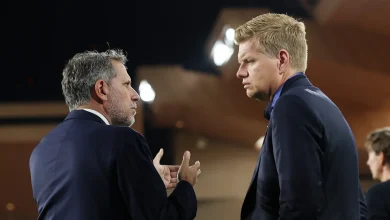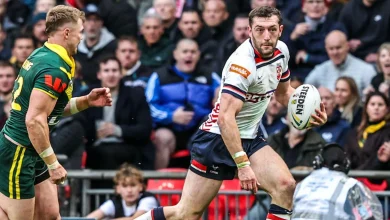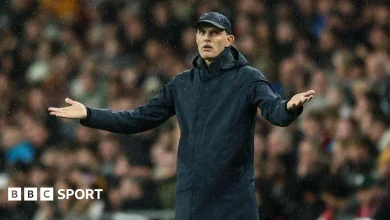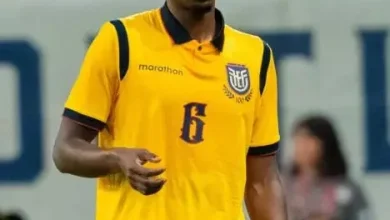What does Boxxer’s new broadcast deal mean for boxing?
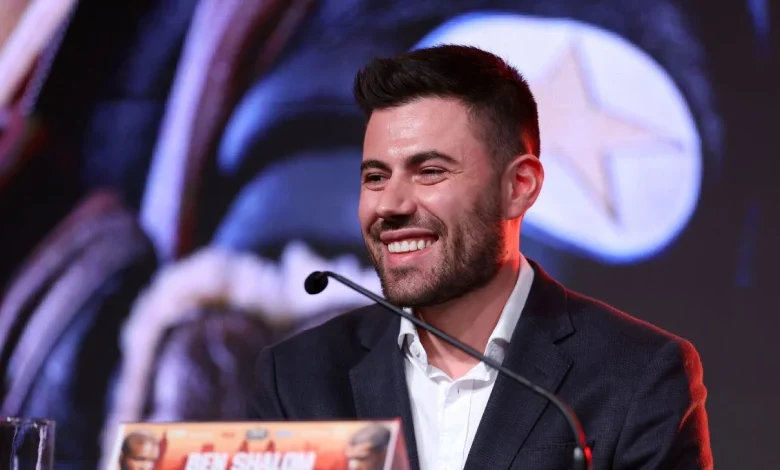
When Lauren Price out-boxed Natasha Jonas at the Royal Albert Hall in March, picking up the WBC and IBF welterweight titles, the Welshwoman declared she wanted two more fights in 2025.
The Jonas-Price bout headlined an all-female card at the iconic London venue and was a big statement from promoter Ben Shalom and Boxxer. His stable, which also includes Chris Eubank Jr., Chris Billam-Smith, Adam Azim, Caroline Dubois and Francesca Hennessy, was on the up.
However, 2025 has not been smooth sailing for Boxxer or its fighters. Price, for example, has not fought since March.
On Saturday, Boxxer’s partnership with the BBC makes its hard-launch with a British heavyweight title clash between Frazer Clarke and Jeamie “TKV” Tshikeva.
So what does the broadcast deal look like and what does it mean for some of the country’s biggest names and rising stars?
Why is Boxxer on the BBC now?
Lauren Price is unified welterweight champion. Zac Goodwin/PA Images via Getty Images
In June, Sky Sports announced they would not be renewing their broadcast deal with Boxxer.
It was an interesting move from the broadcaster and a blow for Boxxer. Broadcasters, especially those the size of Sky, are crucial for promoters. It’s where the majority of the money that bankroll fights come from and provides a platform for fighters.
Speculation around what it meant for all parties swirled.
Boxxer didn’t comment and fighters didn’t know when they would be back in the ring. The void was filled by Shalom’s competitors who were more than willing to stick the boot in. Fighters, including arguably their biggest star Ben Whittaker, chose not to renew their deals with the company, too.
The 30-year-old admits the period was challenging.
“One thing I’ve been able to do over time is completely separate the boxing world from the real world. [Boxing] is an echo chamber,” Shalom told ESPN. “I don’t really have a relationship [with rival promoters] and I don’t really need to. I think they’re competitors. They’ve never wanted competition. But that’s business isn’t it?”
What’s involved in the new deal?
Adam Azim hopes to be back in the ring in January. Getty
This new chapter for Boxxer has been a long time coming but as Shalom points out, moving from one broadcasting giant to another is no simple task.
Boxing has a storied history on free-to-air television in the UK, with shows such as The Big Fight Live on ITV, while the BBC has broadcast many famous fights, including Joe Frazier vs. Muhammad Ali in 1971, which was watched by 27.5 million people.
However, there has been a gap in recent years.
Boxxer want a show a month on the BBC, starting this weekend. Adam Azim is set to headline his first show on the platform in the new year, with Jan. 31 in London being targeted.
Unified welterweight champion Lauren Price is looking to fight in Cardiff in February before targeting an undisputed fight against Mikaela Mayer.
Those are the plans through the start of next year.
Shalom has said the BBC agreement is a “multi-year, multi-fight” deal. The promoter has also said they have the opportunity for a pay-TV agreement with another outlet, which will be announced in the coming weeks.
It means Boxxer fighters will have the ability to fight on non-BBC cards should the opportunity present itself, just as Adam Azim did on the Chris Eubank Jr. vs. Conor Benn 2 undercard, which was broadcast on DAZN.
What does it mean for boxing?
Any time boxing is on free-to-air television, it’s a big deal for the sport.
Editor’s Picks
2 Related
Boxxer have the opportunity capture casual fans and introduce them to their fighters, which is important for them and the growth of boxing.
It also means competition in the industry.
The UK’s two other promotional companies, Matchroom and Queensberry, have exclusive deals with DAZN. If Boxxer can have shows on the BBC while occasionally having their fighters on other major cards, too, it’s a win-win.
“We don’t want to be part of the crowd. We like to stand out,” Shalom said.
“We’ve been so focused on growing as a business, to be focused on grassroots and taking the sport to bigger audiences, that when the BBC opportunity finally came around, it was something that we had to take and timing is everything.”

